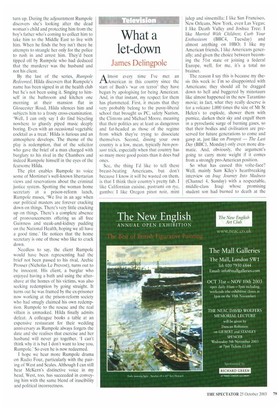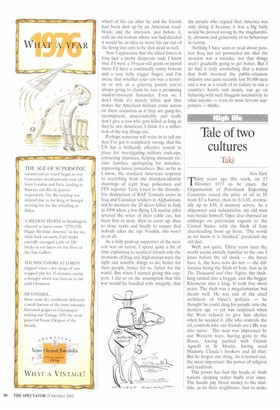What a let-down
James Delingpole
Allost every time I've met an merican in this country since the start of Bush's 'war on terror' they have begun by apologising for being American. And, in that instant, my respect for them has plummeted. First, it means that they very probably belong to the pussy-liberal school that brought us PC, safety Nazism, the Clintons and Michael Moore, meaning that their politics are at least as dangerous and fat-headed as those of the regime from which they're trying to dissociate themselves. Second, dissing your own country is a low, mean, typically bien-pensant trick, especially when that country has so many more good points than it does bad ones.
See, the thing I'd like to tell these breast-beating Americans, but don't because I know it will be wasted on them, is that I think their country's pretty fab. I like Californian cuisine, pastrami on rye, gumbo; I like Oregon pinot noir, mint julep and sinsemilla; I like San Francisco, New Orleans, New York, even Las Vegas; I like Death Valley and Joshua Tree; I like Married With Children; Curb Your Enthusiasm (BBC4, Tuesday) and almost anything on HBO: I like my American friends, I like Americans generally; and given the choice between becoming the 51st state or joining a federal Europe, well, for me, it's a total no brainer.
The reason I say this is because my thesis this week is: I'm so disappointed with Americans; they should all be dragged down to hell and buggered by minotaurs like almost happened in the new Tarantino movie; in fact, what they really deserve is for a volcano 1,000 times the size of Mt St Helen's to explode, shower them with pumice, darken their sky and engulf them in a pyroclastic surge of burning gases, so that their bodies and civilisation are preserved for future generations to come and gawp at, just like on Pompeii — The Last Day (BBC1. Monday) only even more dramatic. And, obviously, the argument's going to carry more weight if it comes from a strongly pro-American position.
So what has caused this volte-face? Well. mainly Sam Riley's heartbreaking interview on Iraq: Journey Into Madness (Channel 4, Sunday) with a respectable, middle-class Iraqi whose promising student son had burned to death at the wheel of his car after he and his friends had been shot up by an American roadblock; and the interview, just before it, with an old woman whose son had decided it would be an idea to move his car out of the firing line only to be shot dead as well.
Now I appreciate that the allied forces in Iraq face a pretty desperate task; I know that if I were a 19-year-old grunt on patrol there I'd have a continually runny bottom and a very itchy trigger finger; and I'm aware that whether your son was a terrorist or not, as a grieving parent you're always going to claim he was a promising student/innocent bystander. Even so, I don't think it's merely leftist spin that makes the American military come across on these occasions as if they are gung-ho, incompetent, unaccountable and really don't give a toss who gets killed as long as they're not American. I think it's a reflection of the way things are.
Perhaps someone will write in to tell me that I've got it completely wrong, that the US has a brilliantly effective system in place for investigating military cock-ups, correcting injustices, helping innocent victims' families, apologising for mistakes, improving future procedures. But, as far as I know, the standard American response to everything from the mistaken-identity shootings of eight Iraqi policemen and ITN reporter Terry Lloyd to the friendlyfire destruction of RAF Tornado crews in Iraq and Canadian soldiers in Afghanistan, not to mention the 20 skiers killed in Italy in 1998 when a low-flying US marine pilot severed the wires of their cable car, has been first to deny, then to cover up, then to close ranks and finally to ensure that nobody takes the rap. Frankly, this won't do at all.
As a fully paid-up supporter of the neocon war on terror, I spend quite a bit of time explaining to sceptical friends why the invasions of Iraq and Afghanistan were the right and sensible things to do; better for their people, better for us, better for the world. But when I started giving this support, I did so on the assumption that this war would be handled with integrity; that the people who argued that America was only doing it because it was a big bully would be proved wrong by the magnanimity, altruism and generosity of its behaviour in victory.
Nothing I have seen or read about postwar Iraq has yet persuaded me that the invasion was a mistake, nor that things aren't gradually going to get better. But I do find it truly astonishing that a nation that both invented the public-relations industry and quite recently lost 58,000 men and a war as a result of its failure to win a country's hearts and minds, can go on behaving with such thuggish insensitivity to what anyone — even its most fervent supporters — thinks.



































































































 Previous page
Previous page